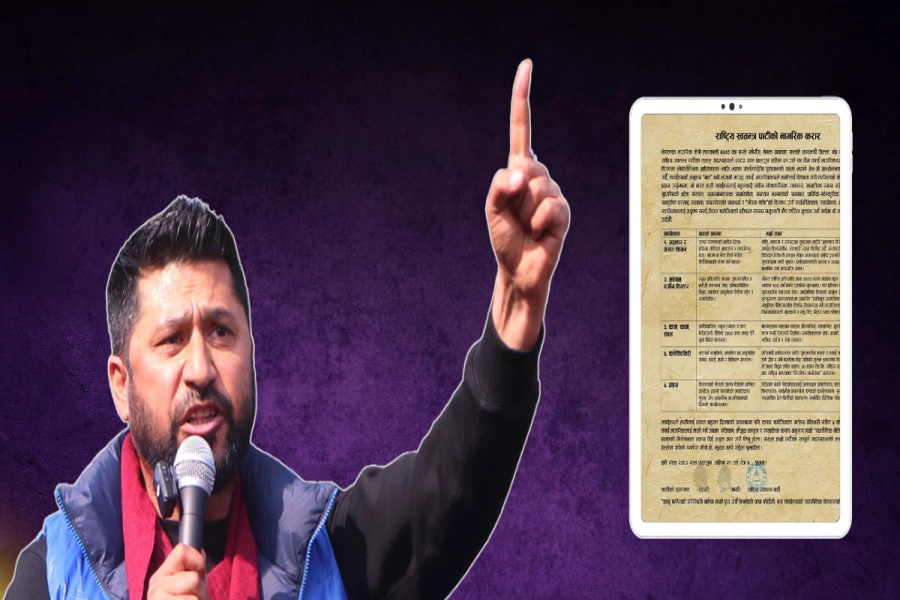Although the battle between ultra nationalists and the readily villainized Nepali diaspora appears to be over economical disagreements on the surface, the true war is entirely political.
Despite only 2.7% of the total population of Nepal is Nepali diaspora, their whopping 24% contribution towards national GDP (October 2022) in remittances is indicative of the great financial prowess the group holds. The diaspora, however, is not just a remittance sending body. At present, it has transformed into an entity strong enough for political actions. Would Rabi Lammichhane, host of “Sidha Kura Janata Sanga”, be a political figurehead had the Nepali migrant workers not held him up for advocating migrant workers’ issues? Would KMC have elected Balen Shah, had the students living abroad not called up their parents to vote for him?
The Nepali diaspora has always been political. Through associations like Jana Samparka Samiti, Jana Pragatishil Manch, and Prawasi Nepali Ekata Manch, the diaspora has been bemoaning for better economical and political rights to rekindle their emotional relationship with the state of Nepal. The ease of access of the internet has aided them in this pursuit. With the increasing Nepali population on social media, 12.60 million in 2023, the ingeniously designed diaspora campaigns are producing favorable results only now. Their outcry for e-voting provisions, chanting “Note Chalne, Vote Nachalne”, has also been possible only due to the easy internet access in Nepal and the group’s growing media influence.
Nepali diaspora in the US surges to over 200,000: Report

CK Raut, now an established mainstream politician, also had humble beginnings abroad. His journey from forming an Alliance for Independence in 2006, writing provocative articles under the aliases of Bishwashan Kumar, Azad, and Inzod, capitalizing the NRN networks for pushing his agendas, to “one rupee bail campaign” and becoming an elected parliamentarian from Saptari-2 is a dream for most expats. Although he did have the major mass impetus on his side, the ideation of his political career did begin in the “foreign” lands of Japan and the USA. Would Raut be as big a sensation had the NRNs not supported his cause?
Last month, I interviewed tourism stakeholders in Pokhara. While I only interviewed 15 individuals from different walks of life, the shared sentiment of “individual excellence but collective failure” was readily apparent. With or without intentions, all interviewees were paving a prerogative for favor. There were flavors of deeply rooted kowtow culture and political ambitions for favoritism.They were looking for a platform where their individual excellence would shine brighter.
I have observed this inclination towards favoritism culture everywhere in Nepal, including in myself. I was apolitical until I turned 16. My first introduction to public service and the system of Nepal was at the District Administration Office in my hometown. While I stood in the queue for my turn, those who arrived after me were getting their work done before me. They knew who to talk to for getting their citizenship faster. I felt wrongly done. I wondered then how favoritism was so normalized? How could I not be political after?
The Nepali diaspora, united by the public sentiment against the traditional malpractices of Nepal, must also be political. Their juxtaposition between the individual excellence of Nepalis abroad and the collective incompetence of the state of Nepal is reminiscent of the 15 interviews I had conducted. The diaspora is also prompt to dismiss political ambitions with benignly disguised “I do not have any political ambitions”. Could they have also been forced into kowtow culture and politics like I was when I turned 16? It is dubious whether the diaspora is political under compulsion or by choice. Regardless, the group must be political; nothing binds Nepalis like the communal resentment and disappointment of our wriggling political and economical progress. After all, is the diaspora not composed of Nepalis like me?
I believe it is human to be political. It is, however necessary, for voters like us to be mindful of our electoral rights and voting decisions. The by-elections of Chitwan-2 and Tanahun-1 clearly paint how much of an influence the great Nepali diaspora has over electoral outcomes. In an era where each Nepali family has at least one relative abroad, it is easy to be influenced. Why should we listen to our relatives who are living abroad?






































